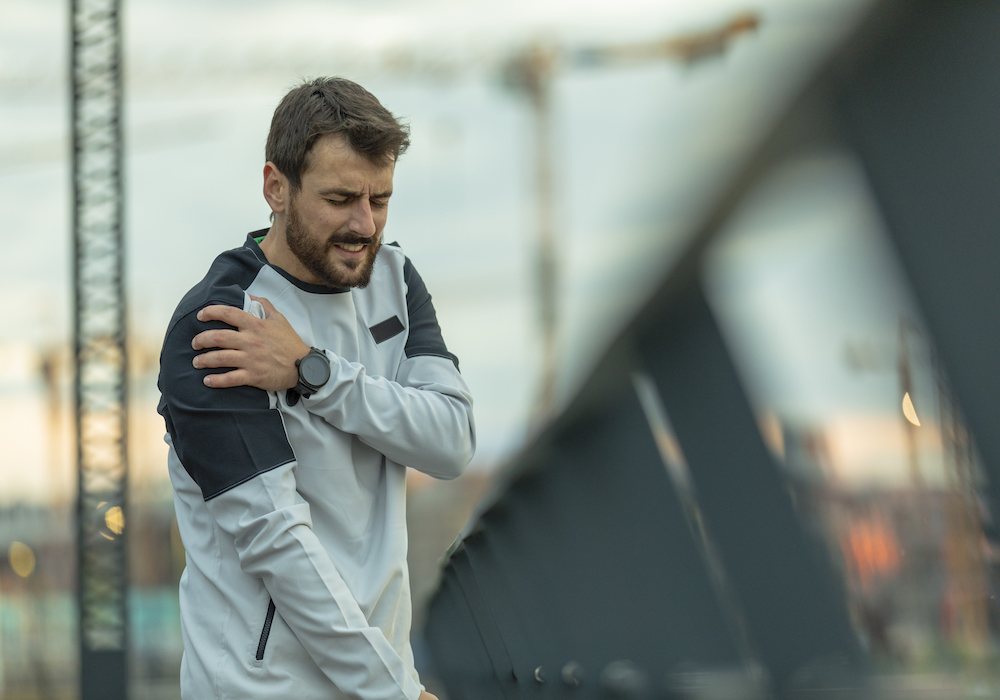There are various shoulder pain causes and conditions that create discomfort or limit range of motion. One of those conditions is called shoulder bursitis.
Shoulder bursitis occurs when the tiny, fluid-filled sacs called bursa that reduce friction between the tissues in your shoulders become inflamed.
These bursae reduce friction anywhere your ligaments, tendons, skin or bones might rub against each other. There are over 150 bursae in your body, and the most are found in your elbows, shoulders and knees, where the most friction is found.
Read on to learn what causes shoulder bursitis, symptoms to watch for, and when to seek treatment.
What causes shoulder bursitis pain?
The bursae are tiny fluid-filled sacs located between your bones and the other soft tissues in your body to prevent friction. If the bursa in your shoulder joint becomes inflamed, it can lead to shoulder bursitis.
The subacromial bursa is at the tip of the shoulder and is the most common area for shoulder bursitis to occur.
Make an appointment with a shoulder specialist
The most common causes of shoulder bursitis are overuse or injury. This is a common sports injury, especially in athletes whose main job is throwing a ball or swinging their arm. Too much movement puts stress on the bursa, causing inflammation.
Another condition, such as arthritis, can sometimes be to blame. Shoulder arthritis breaks down the cartilage in between your bones, causing them to rub together. This friction could put potential stress on the bursa to compensate for the lack of cartilage.
Common symptoms
Symptoms of shoulder bursitis begin with pain and swelling and can become more painful over time. Those symptoms include:
- Sore shoulder with pain around the outside
- Swelling and redness around the shoulder
- Reduced range of motion
- Trouble lifting your arm
- Worsening shoulder pain at night
If a fever accompanies your pain, see a doctor because it could mean your bursa is infected.
What kind of doctor treats shoulder bursitis?
If you suspect you have a shoulder injury, a sports medicine physician is trained to treat conditions of the shoulder.
To determine whether you have shoulder bursitis, your shoulder doctor will ask you for a complete medical history and to describe your symptoms.
The doctor will conduct a physical exam and may order an X-ray or MRI to confirm the diagnosis and determine if there are any other problems.
Types of treatment
To relieve pain and reduce inflammation with conservative shoulder bursitis treatment, your shoulder doctor may recommend the R.I.C.E. method, which stands for:
- Rest
- Ice
- Compressing your shoulder
- Elevating the injury
There are several other treatment options if these don’t give long-term relief to your shoulder bursitis. Non-operative treatment options include:
- Over-the-counter pain medication
- Steroid injections
- Physical therapy
If after six to 12 months of non-surgical treatments have failed, surgery may be required to treat your condition. Your orthopedic surgeon will perform an arthroscopy which is a minimally invasive technique used to drain the inflamed bursa.
Learn more about OrthoIndy shoulder treatments
How to prevent shoulder bursitis
Preventing shoulder bursitis is difficult. However, there are some steps you can take to lower your risk of bursitis, including:
- Using good posture
- Maintaining a healthy body weight
- Easing into a new sport
- Warming up and cooling down before playing a sport
- Varying your athletic movements to prevent overuse
- Cushioning your joints with elbow and knee pads
Find out what’s really causing your shoulder pain
If your shoulder pain causes you to miss out on normal day-to-day activities, we can help. Request an appointment online or call OrthoIndy at 317.802.2000 to book an appointment with one of our shoulder specialists.
If your shoulder injury or condition is recent, you can walk right into one of our OrthoIndy Urgent Care locations for immediate care. For rehabilitation and physical therapy, no referral is needed to see one of our physical therapists.





